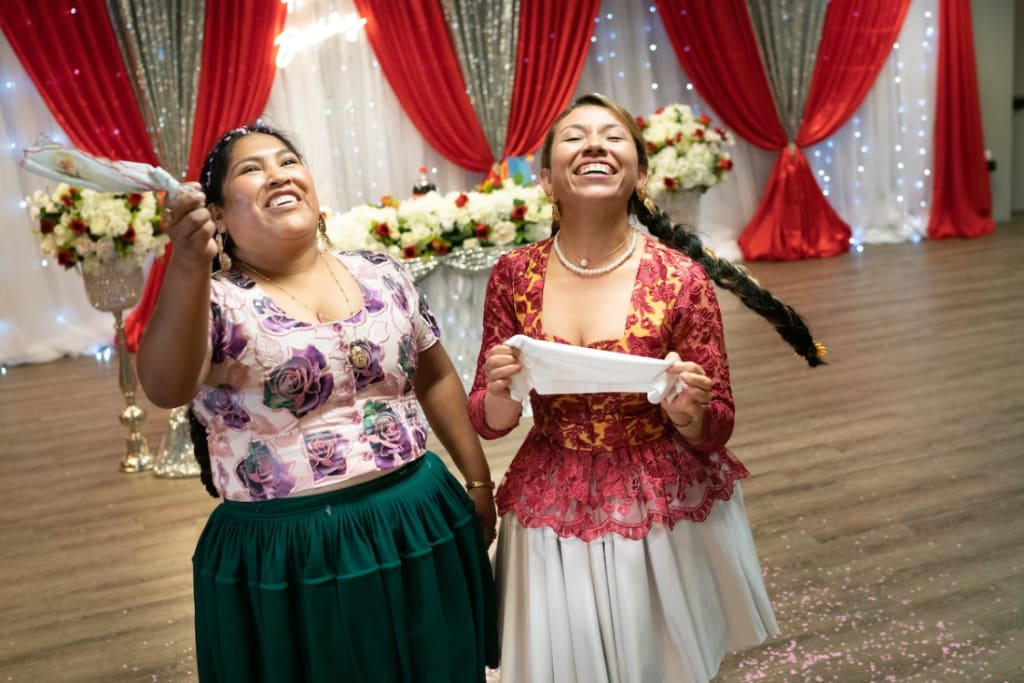How a Bolivian construction worker rose to fame online from her garage in Virginia
The inspiring journey of a Bolivian construction worker turned online sensation from her Virginia garage

María Luz Coca Luján, a Bolivian native living in the United States, uses social media to keep her native culture alive. By transforming herself into a digital persona known as K'ancha, Coca Luján has amassed a following of over 180,000 people on Facebook and TikTok. Her daily radio show features Quechua, an Indigenous South American language, and Spanish. She also helps run an Instagram account promoting Quechua to English-speaking youth. Coca Luján uses her platform to connect with her community of 40,000 Bolivians in Northern Virginia, where she emcees celebrations such as birthdays and graduation parties.
As a child, Coca Luján rarely wore the traditional outfit of her native region's cholitas, which consisted of a colorful, billowing skirt, gold jewelry, and a bowler hat. The cholita outfit and the heritage it stood for were looked down upon and stereotyped in Bolivia. Indigenous women like Coca Luján's mother were forced to leave school early to keep wearing traditional clothing. Only in the early 2000s did conditions change when an Indigenous movement spread throughout Bolivia.
Coca Luján hopes her social media presence will connect younger generations of Bolivians born in the United States or across the Bolivian diaspora to their heritage. She aims to preserve her culture and promote Quechua to English-speaking youth while making her language and culture more accessible to others. Coca Luján's efforts have not gone unnoticed, and she has become an influential figure in her community, known for using slang and nicknames familiar to those in her community. She is dedicated to maintaining the culture and heritage of the Bolivian community and looks forward to future generations embracing and celebrating their roots.
"What I started understanding is that there was something in me that was connected to the culture and Quechua," Coca Luján said. She dove into her native tongue, even enrolling in graduate school to further study the language she had grown up speaking.
In 2012, she won a scholarship to come to the United States, where she hoped to study anthropology and folklore. But she quickly realized she needed a day job to support herself.
She became a construction worker but never lost sight of her love for her heritage. In her free time, she started volunteering at the Bolivian-American Center in Virginia, teaching Quechua to the children of immigrants.
As she started to connect with the Bolivian community, she also noticed something else: the other Bolivian women broadcasting their online shows, speaking to audiences in both Quechua and Spanish.
They were tapping into a wellspring of pride built within the Bolivian community over the past two decades.
"At the beginning, it was just about showing our culture," said Liliana Mamani, a Bolivian American who started broadcasting her online show in 2008. "But now it's about sharing our history and stories with the next generation."
And that has been especially important as the community has grappled with the coronavirus pandemic.
Northern Virginia is home to a large population of Bolivian immigrants who have been hit hard by the pandemic, both physically and economically. Many works in essential jobs, from restaurant kitchens to construction sites, and have struggled to stay afloat as the virus has spread.
Coca Luján said her show has helped provide a sense of community and support during a difficult time. During the pandemic, she has used it to fund needy families and provide information on health and safety measures.
"It's about being there for the community," she said. "We're living through a tough moment."
Her journey, from feeling ashamed of her heritage to broadcasting it on social media, has been a remarkable one.
As she wrapped up her show one recent afternoon, she was still in full cholita regalia. She took a few moments to show off the intricacies of her outfit — the layers of petticoats, the braided hair, the gold brooches. She smiled broadly as she described the traditional meaning of each piece.
"This is not just a costume," she said. "It's a symbol of our history, of our identity. It's a way to show that we're still here."
And with every show she broadcasts, she is helping ensure that her community will continue to be there, too.





Comments
There are no comments for this story
Be the first to respond and start the conversation.